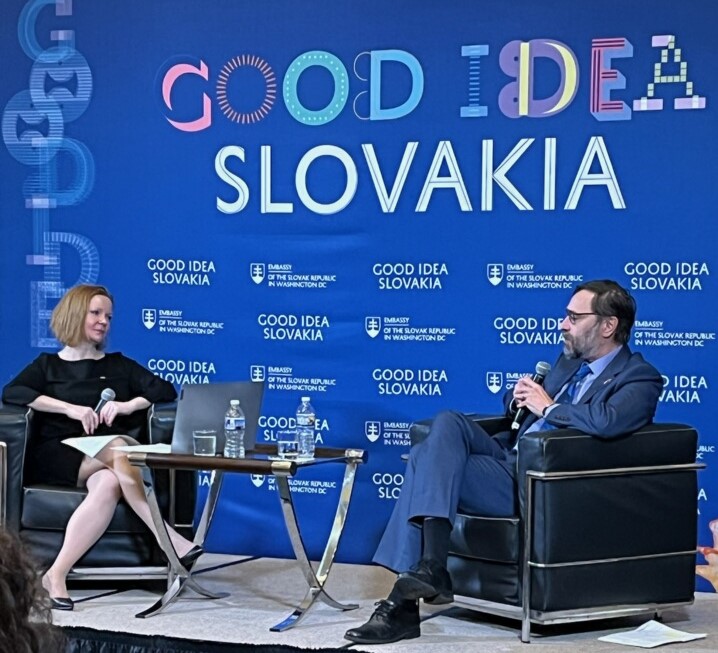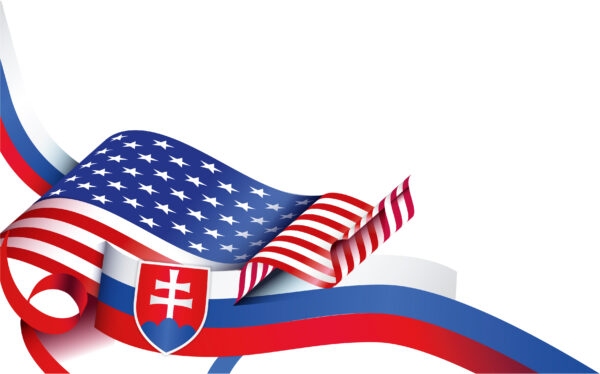Slovakia@30, a four-part lecture series commemorating the 30th anniversary of Slovak independence, launched on January 18, 2023, with a presentation by H.E. Radovan Javorčík, Slovak ambassador to the United States, entitled “30 Years of Slovak Foreign Policy.”
The series was conceived by Helen Fedor, program chair of the Slovak American Society of Washington, DC (SASW), and is a collaborative project of SASW, Friends of Slovakia (FOS), and the Slovak Embassy in Washington.
 Dr. Martina Hrvolová, vice chair of FOS, moderated the session, which included a lively question-and-answer period following the presentation. The in-person event at the Slovak embassy was also broadcast as an Internet live stream for participants in the United States, Slovakia, and elsewhere in Europe.
Dr. Martina Hrvolová, vice chair of FOS, moderated the session, which included a lively question-and-answer period following the presentation. The in-person event at the Slovak embassy was also broadcast as an Internet live stream for participants in the United States, Slovakia, and elsewhere in Europe.
For most of the first decade of Slovak independence, the primary goal was to create new state institutions, including a central bank and Slovak currency, a competent civil administration, a general staff for the military, and a professional diplomatic service. Although separation from the Czechs was entirely peaceful, “We started as a country that had no identity,” Ambassador Javorčík said. And while seeking membership in NATO and the European Union was an explicit goal from the beginning, domestic political crises led to Slovakia’s exclusion in the first round of NATO and EU enlargement. Watching the Czech Republic – but not Slovakia – be admitted to NATO in 1999 “was the worst professional moment of my life,” the ambassador said.
Happily, the second decade of independence was a time of progress and consolidation. Slovakia became a respected member of NATO and a core member of the EU. It adopted the euro as its currency, joined the Schengen Area of open European borders, and became a member of the U.S. visa waiver program. All these developments facilitated trade and investment, and led to Slovakia being called the economic “Tiger of Europe.”
In the third decade the country saw itself as an island of peace and tranquility that could ignore troubles elsewhere, “but unfortunately this was not the truth,” the ambassador continued. Populist, socialist, and nationalist movements grew in strength, fascists became part of the parliament, and corruption became a buzzword in Slovakia, he said. And so, while this was the decade in which Slovakia elected its first president who had not been a member of the Communist Party, and its first female president, it was also the decade that witnessed the brutal murder of investigative journalist Ján Kuciak and his fiancée, the weaponization by Russia of oil and gas deliveries, and the Russian invasion of Slovakia’s friendly neighbor Ukraine.
Slovakia thus finds itself at a time of soul searching as the fourth decade of independence begins. Fortunately, its membership in the EU encourages the modernization of the economy, education, digitalization, and climate policy – all things that are also dear to American hearts. “I hope this decade will be brighter than all the others,” Ambassador Javorčík concluded.
Visit our YouTube channel to view the presentation.


